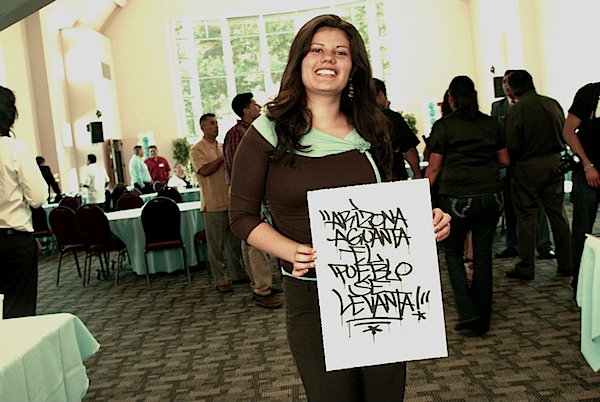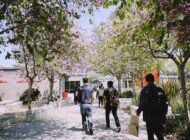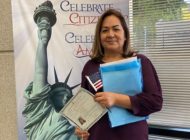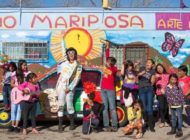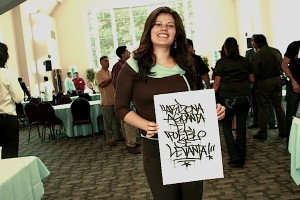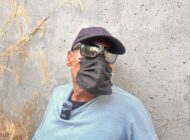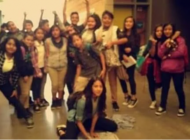“Ana Miriam is one of the students who diligently worked behind the scenes to assert the needs of undocumented students on campus, and advocated for a resource center from which she will not even directly benefit; but she did it for the love of her community and the belief that education is a right for all, regardless of status,” says Tracy Buenavista, professor of Asian American studies at CSUN.
By MARITSA RAMÍREZ
EL NUEVO SOL
En español
For many students, attending a university is simply a path for professional improvement. For first-generation students, attending a university is a path to improve the situation of one’s family. But for some students, attending a university is a way to improve the situation of one’s family, as well as a way of improving the community and the university.
Ana Miriam Barragán, 23 years old, belongs to the latter group. Her educational journey has had the common obstacles that many undocumented students who are the first in their families to attend college face. Yet one of the Barragán’s priorities in her time at the University, in addition to her studies, has been helping other students in the same situation.
Barragán is a first generation student who graduated with honors from California State University, Northridge (CSUN) in mid-May with degrees in both Psychology and Deaf Studies and a minor in Chicano Studies. But besides her academic success, Barragán has been one of the leaders of the student organization Dreams To Be Heard that fought to establish a resource center for undocumented students.
“In the future, undocumented students at CSUN will not have the immediate opportunity to work with Ana Miriam, but their success on campus would not have been possible without her,” says Tracy Buenavista, Barragán’s professor from the Asian American Studies department. “Ana Miriam is one of the students who diligently worked behind the scenes to assert the needs of undocumented students on campus, and advocated for a resource center from which she will not even directly benefit; but she did it for the love of her community and the belief that education is a right for all, regardless of status. Her activism is a reminder of what young people can do and an inspiration to continue to fight for our future.”
But Barragán believes that her greatest achievement is more modest. “My greatest achievement,” Barragán says, “has been helping people one on one, knowing that I am able to provide them with resources and that I can help change their lives.”
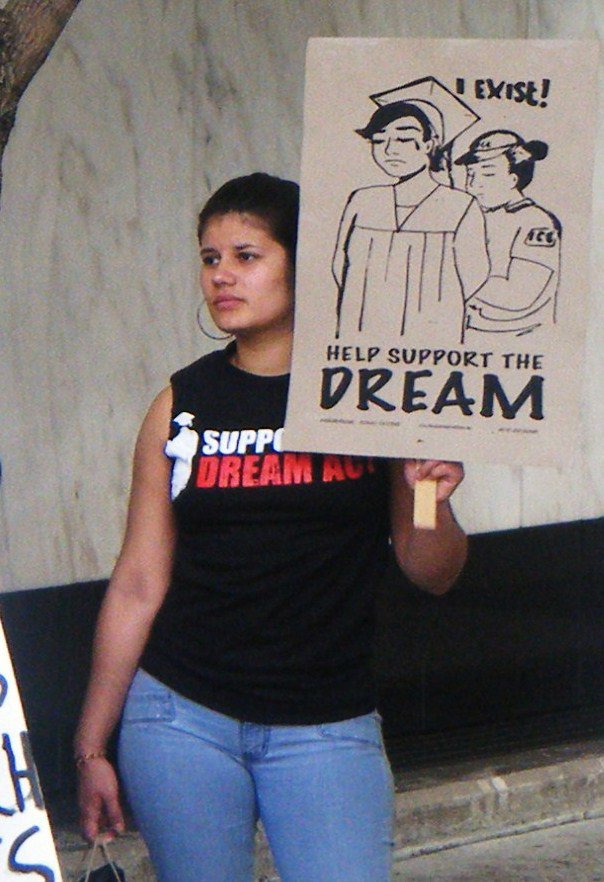
“I am not afraid to say I am undocumented because being undocumented doesn’t define who I am, it only defines my struggle.” Photo courtesy of Ana Míriam Barragán.
Barragán is one of the 7 to 13 thousand undocumented students estimated to be studying at American universities and one of the hundreds undocumented students at CSUN. Unfortunately, not every undocumented student completes their university education because up until recently they were unable to attain financial aid from the state and are still unable to apply for federal financial aid.
Barragán’s story illustrates the obstacles that undocumented students face and also demonstrates the value of student efforts to serve the community. Barragán lived in Guadalajara, Jalisco with her mother, brother and sister until she was ten years old. Her father did not live with her family during her childhood because he lived in the United States for work.
“One time my father returned to Mexico to visit us and we did not recognize him.” Says Barragán. “That’s when he decided to bring the family to the United States. He knew we would have more opportunities here.”
In 2001 her father paid a coyote to help the family cross the Mexico-Unites States border in a car. Barragán was only ten years old when she crossed the border to begin a new life in the United States.
“The coyotes were really expensive because we crossed in a car instead of swimming or walking through the desert,” says Barragán. “My father decided to pay more so we wouldn’t struggle as much.”
Her mother, brother and sister did not cross the border at the same time. They were separated because the adults were driven across the border in a van while the children crossed in small cars. Her brother and sister crossed at the same time because her brother was very young at the time and would not stop crying when he was alone.
Barragán had to cross the next day because she could not memorize “my name is _______ and I am a North American citizen” in English.
“I was very nervous to pronounce the words correctly. I had to memorize a fake name, age and address in case the officials asked me for my information.”
She crossed the border successfully by foot and was picked up by a car on the other side that took her to Los Angeles where her uncles were waiting for her.
Her family moved to Boonville in northern California where her father worked in the grape fields for the wine industry.
She started elementary school in fifth grade but because the students were predominantly Latino, Barragán did not learn English right away.
“During my first two years I had an interpreter or friends who would translate for me. I did not learn English until middle school,” says Barragán.
Trying to learn English and having more difficult classes in middle school was a struggle for Barragán. She says that even to this day she is made fun of because of her accent.
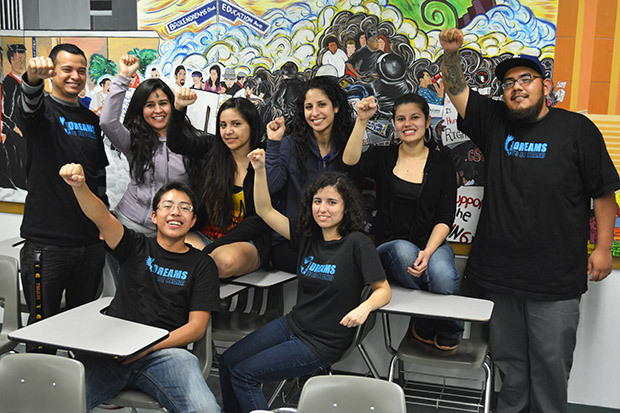
After organizing with CSUN administration, Dreams To Be Heard members will be opening an undocumented resource office in the Fall. Photo Credit: John Saringo-Rodriguez
“Many people look at me and think I am not intelligent enough because of my accent,” says Barragán. “But I always tell them that I don’t think with an accent.”
Her father’s job was not enough to support the family of five so her mother began working in the grape fields as well. This was the period when Barragán’s life became increasingly difficult. Once her mother began working her father stopped. He began using drugs and became addicted to methamphetamine.
Barragán knew she had to help support her family. She began working in the grape fields when she was twelve years old during her winter and summer vacations from school. When she was in eighth grade she began working in a restaurant as a dishwasher. She later became a waitress and stayed at the restaurant until her senior year. She learned the value of hard work and dedication from a young age.
Barragán knew that the only way to succeed and better herself was through education. Her parents were very strict and did not let her date or go out with friends. They wanted her to concentrate on her grades and to pursue a college education.
But because Barragán is undocumented, she could not apply for financial aid to help her pay for a university tuition.
Barragán knew from a young age that the only way to pursue a college education was to work hard to get perfect grades in hopes of earning scholarships.
“My parents never have me another option,” says Barragán. “They always said: ‘You go to school or you go to school. You are going to college, we don’t know how but you are going to college.’”
She studied hard and earned straight A’s throughout high school. Although she had perfect grades, she began to feel self-doubt during her senior year. She had worked hard to earn good grades and felt that she deserved to go to a four-year university not a two-year community college.
In 2009, during her graduation from Anderson Valley High School the winners of various scholarships were announced. Barragán won almost $82,000 in scholarships. She has received multiple scholarships but the largest amount was from a scholarship donated by an alumnus from Anderson Valley High School.
She was thrilled to know that her dream of attending a university was going to become a reality. She decided to come to CSUN because she wanted to continue learning sign language from the Deaf Studies department.
Unfortunately, her scholarships were not enough.
“My mistake was thinking that college was only four years and not maybe a little bit more so I divided by scholarship within four years,” says Barragán. “I started living in the dorms which was my biggest regret because almost all of my scholarship money went to the dorms.”
In 2013 she realized that she needed one more year at CSUN due to her double major but she had already spent all of her scholarship money. She applied for financial aid through the California Dream Act and received some aid but it was still not enough to cover her school expenses and had to look for a job. One job was not enough and had to find two more. She worked for Outreach and Recruitment services at CSUN, as a Spanish tutor for three young students, and ironing clothes on the weekends.
The numerous obstacles Barragán faced did not prevent her from achieving her goals. Upon her arrival at CSUN she joined organizations like MEChA and Dreams to be Heard, an organization that aids and informs undocumented students. Her second her at the university, Barragán began to become more involved in the organizations and took leadership positions. She began to attend events to raise money for scholarships for undocumented students and petitioned against the banning of ethnic studies in Arizona (HB2281).
Barragán was also a key member in the establishment of a resource center for undocumented students at CSUN.
“We wanted to bring awareness about the issue that there are over one thousand undocumented students here [CSUN] but we don’t have the resources,” says Barragán. “Even though AB540 passed thirteen years ago, we still don’t have the same access to education and that was our concern. That was our main problem with the administration, they don’t know how to help us. They are not trained to give us the answers.”
In 2013, 931 CSUN students applied for financial aid through the California Dream Act and only 452 received aid. This is when Barragán and the members of Dreams to be Heard became aware that the administrators were not taking action to find a solution to this issue.
“The administration is not providing equal access to education for us,” says Barragán. “We decided to start working to establish a center of resources that will help not only in academic affairs but also with legal services.”
Barragán and Dreams to be Heard persuaded the provost of CSUN of the need for a resource center for undocumented students, which will begin to be established in the summer of 2014.
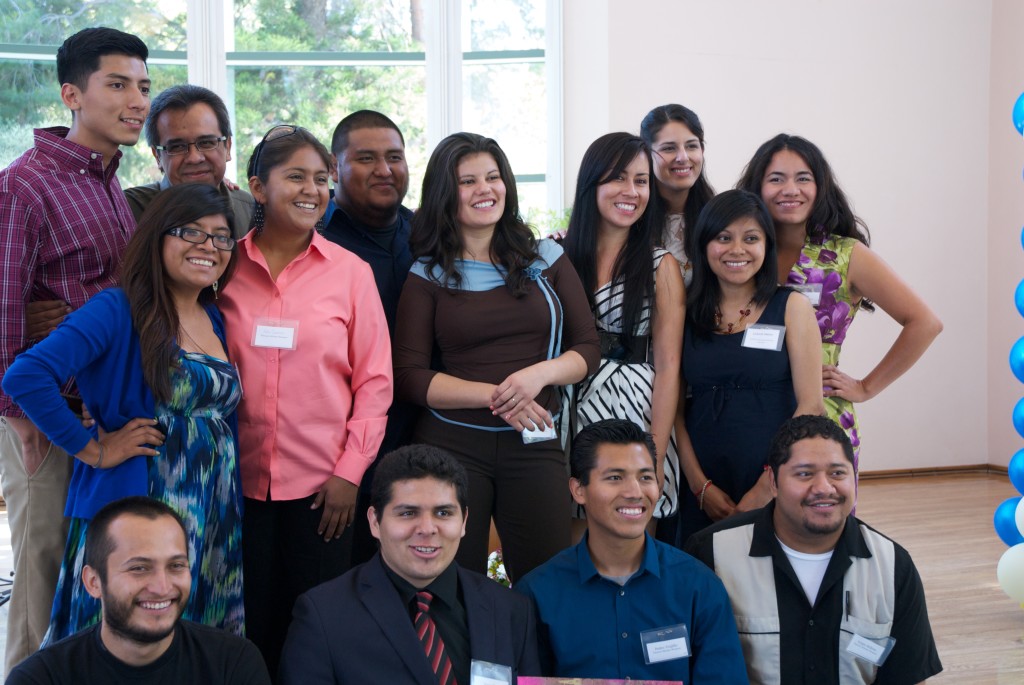
Ana Míriam Barragán with students and allies. Photo: Tom & Ethel Bradley Center.
Even without the existence of this resource center, the students of Dreams To Be Heard have been able to help other undocumented students apply for DACA, an order approved by President Obama in 2012 that allows undocumented immigrants who came to United States as Children get a two year permission to stay and work legally in the United States without fear of deportation.
“The cost of the application is $465. Lawyers were charging a ridiculous amount for help with the application when it is simple enough,” says Barragán. “But we are an easy group to be exploited, so many lawyers take advantage of undocumented people.”
Dreams To Be Heard organized a clinic to help undocumented students apply for DACA, with each application reviewed at no cost.
Barragán graduated with honors in mid-May of 2014, but she didn’t want to attend the ceremony. Her father was deported to Mexico in January of 2012 and her mother decided to go return with him in August. Because of this, her parents could not attend her graduation.
“I’m here because they motivated me to do well,” says Barragán. “Seeing how hard they worked. Working in the fields is the biggest encouragement to get an education and do better for myself and for my community. Knowing that my parents are my main motivators and not having them here for my graduation is very difficult because I think they deserve it. They deserve seeing me walk. With all the challenges being an undocumented student, I wish they could be here.”
“Her siblings graduated this year as well. Her sister, 26 years old, graduated from a two year community college and her brother, 17, from high school.
In addition to her three jobs, her studies and her activism, during the spring semester, Barragán was attending a preparatory program to apply for admission to the law school at the University of California in Los Angeles (UCLA Law Fellows program). Students receive workshops, lectures from current UCLA law professors, and guidance with the application process (LSAT, financial aid, application, personal statement, etc.).
Barragán has high hopes for her future after graduation. She plans to continue her studies and become a lawyer. She hopes to be able to start a non-profit organization to help undocumented immigrants in areas such as education, identity issues, poverty, immigration and parenting styles.
Her professors and mentors have no doubt that she will achieve their personal goals and her goals to help others.
“She is one of the best students I have ever had,” says Rodolfo Acuña, one of her professors and mentors from the Chicano Studies department. “She is very dedicated. She had some scholarships when she arrived at CSUN and did not want to apply for other scholarships because she did not want to compete with other students who may be just as needy. That’s how Ana Miriam is; she is very kind and thinks of others. She is an exceptional person and she will have a lot of success in her life.”
Before finishing the interview, she strongly concludes by stating:
“I am not afraid to say I am undocumented because being undocumented doesn’t define who I am, it only defines my struggle.”
Tags: AB 540 Ana Míriam Barragán Anderson Valley High School Boonville California Dream Act CSUN DACA Dreams To Be Heard Maritsa Ramírez Tracy Buenavista undocumented students







